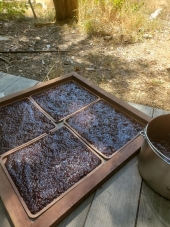


100th Issue of Permaculture Magazine
will be released to subscribers in:
soon!


Christopher Weeks wrote:We bought a disposable can of spray oil four years ago when we got our first air fryer but we haven't used it up yet. Thirty years ago we had a refillable stainless steel and plastic can that you could pressurize by hand-pumping but it kept getting clogged with sticky olive oil so we got rid of it. Mostly we use brushes for the kind of thing you're talking about though we don't really use the waffle iron very often.

Anne Miller wrote:My question is how do you get those lard or tallow to replace cooking spray?


M.K. Dorje Sr. wrote:But I'm curious, how do you make manzanita sugar? And would Hairy Manzanita (the main species in my food forest) be a good species to make it from?


